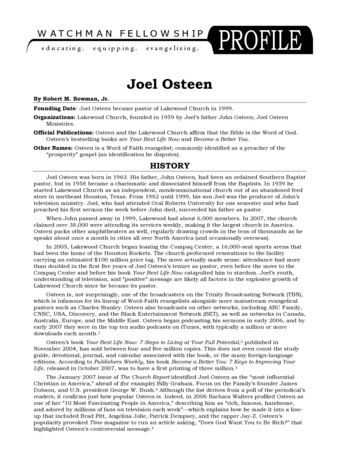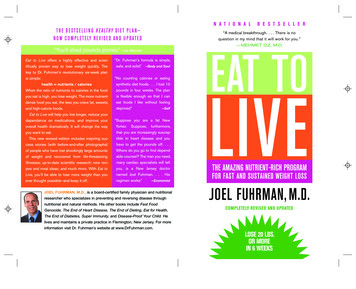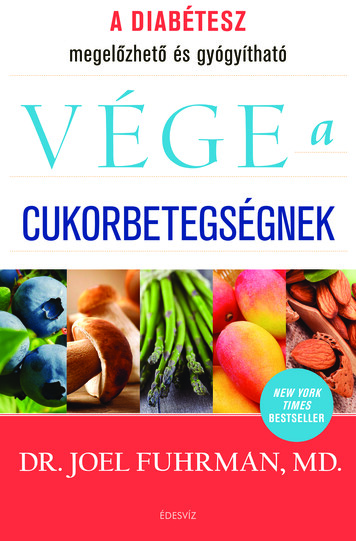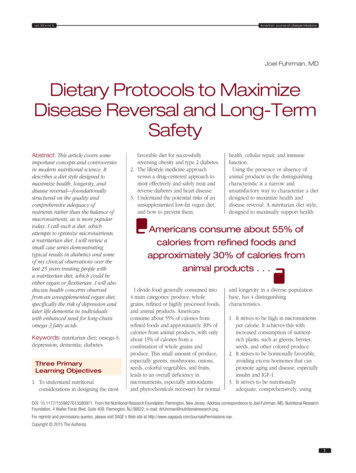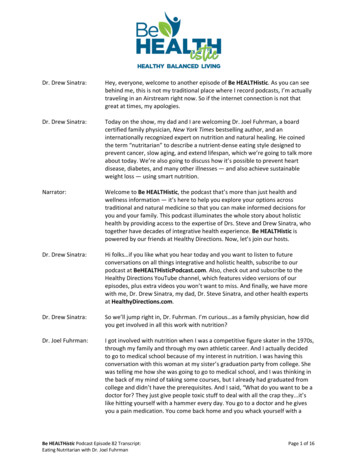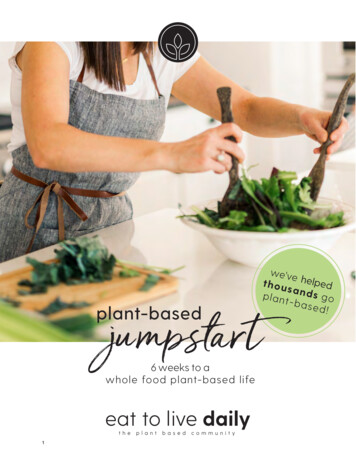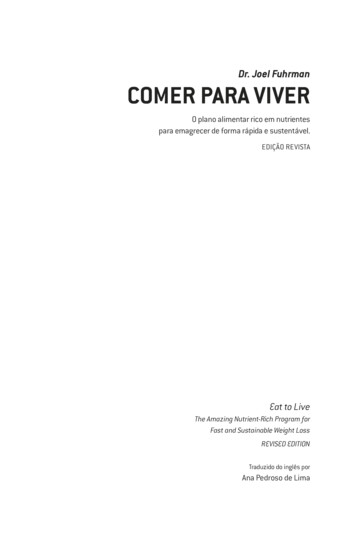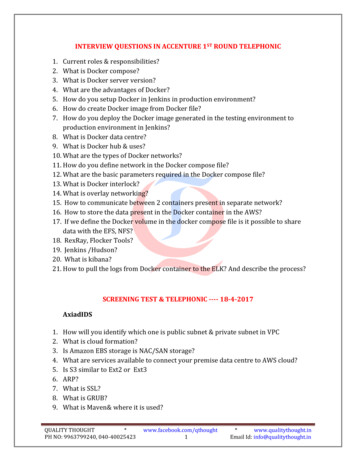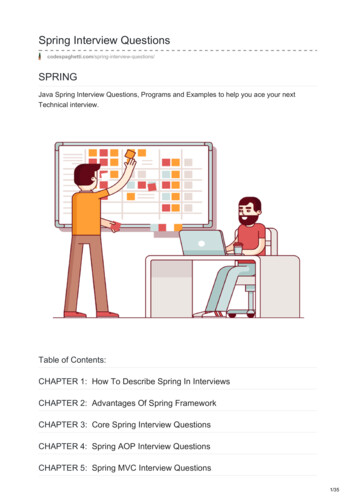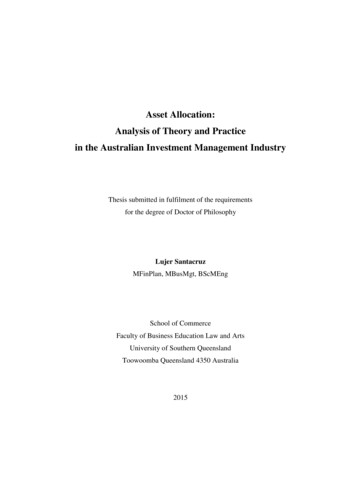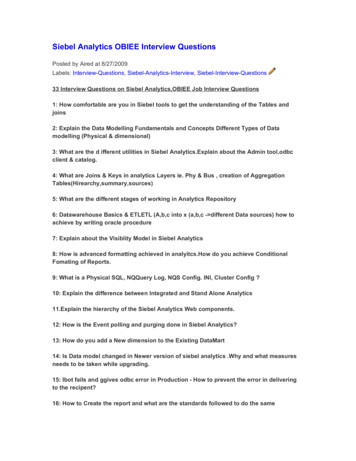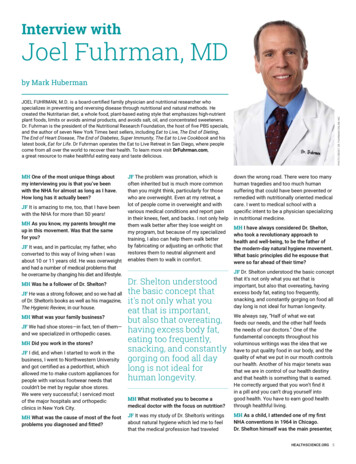
Transcription
Interview withJoel Fuhrman, MDby Mark HubermanMH One of the most unique things aboutmy interviewing you is that you’ve beenwith the NHA for almost as long as I have.How long has it actually been?JF It is amazing to me, too, that I have beenwith the NHA for more than 50 years!MH As you know, my parents brought meup in this movement. Was that the samefor you?JF It was, and in particular, my father, whoconverted to this way of living when I wasabout 10 or 11 years old. He was overweightand had a number of medical problems thathe overcame by changing his diet and lifestyle.MH Was he a follower of Dr. Shelton?JF He was a strong follower, and so we had allof Dr. Shelton's books as well as his magazine,The Hygienic Review, in our house.MH What was your family business?JF We had shoe stores—in fact, ten of them—and we specialized in orthopedic cases.MH Did you work in the stores?JF I did, and when I started to work in thebusiness, I went to Northwestern Universityand got certified as a pedorthist, whichallowed me to make custom appliances forpeople with various footwear needs thatcouldn’t be met by regular shoe stores.We were very successful; I serviced mostof the major hospitals and orthopedicclinics in New York City.MH What was the cause of most of the footproblems you diagnosed and fitted?JF The problem was pronation, which isoften inherited but is much more commonthan you might think, particularly for thosewho are overweight. Even at my retreat, alot of people come in overweight and withvarious medical conditions and report painin their knees, feet, and backs. I not only helpthem walk better after they lose weight onmy program, but because of my specializedtraining, I also can help them walk betterby fabricating or adjusting an orthotic thatrestores them to neutral alignment andenables them to walk in comfort.Dr. Shelton understoodthe basic concept thatit's not only what youeat that is important,but also that overeating,having excess body fat,eating too frequently,snacking, and constantlygorging on food all daylong is not ideal forhuman longevity.PHOTO CREDIT: DR. FUHRMAN ONLINE INC.JOEL FUHRMAN, M.D. is a board-certified family physician and nutritional researcher whospecializes in preventing and reversing disease through nutritional and natural methods. Hecreated the Nutritarian diet, a whole food, plant-based eating style that emphasizes high-nutrientplant foods, limits or avoids animal products, and avoids salt, oil, and concentrated sweeteners.Dr. Fuhrman is the president of the Nutritional Research Foundation, the host of five PBS specials,and the author of seven New York Times best sellers, including Eat to Live, The End of Dieting,The End of Heart Disease, The End of Diabetes, Super Immunity, The Eat to Live Cookbook and hislatest book, Eat for Life. Dr Fuhrman operates the Eat to Live Retreat in San Diego, where peoplecome from all over the world to recover their health. To learn more visit DrFuhrman.com,a great resource to make healthful eating easy and taste delicious.down the wrong road. There were too manyhuman tragedies and too much humansuffering that could have been prevented orremedied with nutritionally oriented medicalcare. I went to medical school with aspecific intent to be a physician specializingin nutritional medicine.MH I have always considered Dr. Shelton,who took a revolutionary approach tohealth and well-being, to be the father ofthe modern-day natural hygiene movement.What basic principles did he espouse thatwere so far ahead of their time?JF Dr. Shelton understood the basic conceptthat it's not only what you eat that isimportant, but also that overeating, havingexcess body fat, eating too frequently,snacking, and constantly gorging on food allday long is not ideal for human longevity.MH What motivated you to become amedical doctor with the focus on nutrition?We always say, “Half of what we eatfeeds our needs, and the other half feedsthe needs of our doctors.” One of thefundamental concepts throughout hisvoluminous writings was the idea that wehave to put quality food in our body, and thequality of what we put in our mouth controlsour health. Another of his major tenets wasthat we are in control of our health destinyand that health is something that is earned.He correctly argued that you won’t find itin a pill and you can’t drug yourself intogood health. You have to earn good healththrough healthful living.JF It was my study of Dr. Shelton's writingsabout natural hygiene which led me to feelthat the medical profession had traveledMH As a child, I attended one of my firstNHA conventions in 1964 in Chicago.Dr. Shelton himself was the main presenter,HEALTHSCIENCE.ORG 5
MH I have often observed that some of theold-time natural hygienists would rather diewith their principles than live with what theyperceived as their compromises.and I remember a banner that proclaimed,"Your health is your business!”JF That’s exactly right. The point theywere making is that you only get one body,and since that is the case, what's moreimportant than taking care of your health?You blow that, you have nothing. From mystandpoint, elementary schools need toteach more than just reading, writing, andarithmetic. They should also be teachingnutritional science; it’s critical informationneeded in today’s junk-food society tosave lives.MH Another revolutionary concept I recallthe early hygienic physicians preachingwas the need for the medical professionto teach people autonomy in their healthcare, with the goal that people can learnhow to control their own health destinyrather than be dependent on physiciansor others. Were they right about that?JF Of course, and that’s true for all stages oflife. For example, we now know that what awoman eats, not just during her pregnancy,but in the years before she gets pregnant,affects the health of her children. Today, wehave an explosion in the number of childrenwith brain tumors and acute leukemia, andso often it is what the mother ate prior tobecoming pregnant that can still do damageto her eggs.MH I would also like your thoughts onsome of the other fundamental principlesof the early natural hygienists, like theirrecognition that the focus of medical careshould be on identifying the causes of ourdiseases and not treating or palliating their6 HEALTH SCIENCE SUMMER 2021symptoms. Were they right about that?JF Yes and no. Certainly, there are manysymptoms that can be manifestationsof detoxification, and the approach ofconventional medicine in trying to suppressthings like headaches and certain typesof rashes is misguided. But at the sametime, if you fall victim to hygienic rigidity, itmay force you to miss things that are notdetoxification reactions, but rather could beinfections that might be easily treated orresolved with medication. In my many yearsof taking care of natural hygienists andvegans, I have seen people who've died ofpneumonia for refusing to take an antibioticand people who have become paralyzeddue to B-12 deficiency for not taking asupplement, because they believed thatnatural hygiene taught that all medicinesare poisons. I have seen the same tragicbeliefs and outcomes for people sufferingfrom dementia and Parkinson’s disease whorefused simple supplementation.However, while there aresome foods that are veryimportant to eat raw,there are other foods thatare more advantageouswhen you cook thembecause it offers betterprotein bioavailabilityand absorption ofnutrients.JF True. It’s important to always rememberthat while the natural hygienists taught usa great deal of wisdom when it comes tohealth care, it was not a complete bodyof knowledge. There were always morethings that needed to be known. I think Dr.Shelton and some of his contemporariesoversimplified things to the point ofconveying that we didn't need to knowanything else about any condition. Forexample, they mistakenly argued thatsyphilis was not caused by a specificinfectious agent and that other infectionswere not viral-induced. I think they also gavethe impression that fasting and a good dietcould cure everything, and those notions ledpeople into many unfortunate situations.MH Let’s talk about a few other traditionalnatural hygiene notions, one of which wasthat “cooked foods are dead foods,” theidea being that if you cook your foods, theenzymes, vitamins, and other nutrients aredestroyed. Any truth to that claim?JF It's actually partially correct becausethere are certain foods which have enzymesthat are necessary to make anticancerphytochemicals that are released as youbreak down their cell walls by chewing.For example, cruciferous vegetables havean enzyme called myrosinase in the cellwall that is deactivated by cooking. Whenyou chew those vegetables raw, you formisothiocyanates (ITCs) and other beneficialcompounds in your mouth. ITCs havepowerful anticancer effects, but theyalso actually prevent the expression ofDNA defects that would normally lead toautoimmune conditions or cancer. So, byeating these kinds of food raw, it can keepgenetic defects unexpressed, preventingthem from causing damage. The point I'mmaking is that by knowing that the enzymesin these foods are deactivated by heat, wecan pay attention to eating more of themraw and chewing them very well.Whenever we do choose to cook thosefoods, if we blend them, chop them finely,or purée them while raw, the beneficialcompounds are formed outside the body.Then the foods can be cooked, eithersteamed or used in a stew or a soup, andstill retain their value. Once they’re formed,the ITCs won’t be destroyed by the heatfrom water-based cooking, but the heat
would have inhibited their formation hadwe not broken down the cell wall before thefood was cooked.However, while there are some foods thatare very important to eat raw, there are otherfoods that are more advantageous when youcook them because it offers better proteinbioavailability and absorption of nutrients.Beans and mushrooms are great examples.So, yes, certain foods are better to have rawand certain foods are better to have cooked.Once we understand the science, we areable to prepare foods in ways that retain themost nutrients.MH What has modern-day science taughtus about the claimed benefits of foodcombining? Is there really a health ordigestive benefit to consuming foods incertain combinations?JF There was some small degree of sciencebehind it, but it's not enough to make adifference in long-term health. The majorscience behind it was that if you have toomuch variety at one meal, it can generallylead to overeating and the indigestion thatoften goes with it. The stomach is alwayshighly acidic, not alkaline or acidic dependingon the protein or carbohydrate in a meal,so food combining’s alkaline/acid claimsare not supported by science. Some of thebiology there is incorrect, but we know moreabout how that works now. Don’t fret overfood combining; just don’t eat until stuffed.MH Another concept that I remember wasthat spices, even things like onions andgarlic, were irritants and should be avoided.Do you recall that as well?JF I do, and during the first five years ofmy medical practice, I almost reflexivelyfollowed that principle, not recommendingthat people use garlic with the belief thatit contained some toxins and would be tooirritating. However, science hasn’t supportedthat. In fact, it’s just the opposite: studieshave now shown that when people consumeonions, garlic, and other spices, theyactually live longer and have lower rates ofcancer. We always have to be careful aboutdeveloping a hypothesis about foods basedon limited data and short-term observations.It is much more important to look at largenumbers of people utilizing these foods overan extended period of time and recordingthe outcomes. Those studies have nowbeen done, and the outcomes are stronglypositive, especially for onions. Onionsare one of the most powerful anticancerfoods you can possibly eat, and that iswhy I include them in my G-BOMBS (shortfor greens, beans, onions, mushrooms,berries, and seeds). However, it is true thatthe overuse of “hot” spices can increaserisk of gastric cancer, and drinking veryhot beverages daily, like hot tea, can evenincrease risk of tongue or throat cancer.MH One other old notion from my naturalhygiene childhood that I would like youto address involves their cautioningagainst consuming “fractionated foods,”with the argument being that if you juiceor blend your foods, you are destroyingtheir fiber, creating oxidation, andsignificantly diminishing the nutritionalvalue of those foods.JF Once again, there is some truth there,but not to the extent claimed. We certainlydon’t recommend that people consume fruitjuices, because when you extract the fiberfrom the food, you increase its glycemicload and convert a favorable food to anunfavorable food. Conversely, when youchew something with the food matrix in yourmouth, you are mixing it with your salivaand forming more beneficial compounds.So, yes, there are definite advantages tochewing your food rather than juicing it.In addition, even if you are puréeingsomething into a smoothie or a blendedsalad, you still should minimize the amountof fruit consumed, since you don’t want tohave too high a proportion of fructose andsugar in the diet compared to the othernutrients you consume.MH I gather, then, that your ideal smoothiesare not fruit smoothies?JF Correct. Maybe use a little bit of fruit,like berries, for flavor, but the dominantingredients should be vegetables. Thisbrings to mind an important point. Over theyears, I have seen a lot of natural hygienistswhose diets border on fruitarianism,and they can often thrive when they'reyounger. However, as they age, their abilityto assimilate protein goes down, and theamount of sugar they consume comparedto both macro- and micronutrients is toohigh, exposing them to increased fungalinfections, pneumonia, and muscle-wasting.The key is to make sure that your diet ismore vegetable-based with beans, nuts, andseeds, while also, of course, including fruit.MH The last traditional hygienic notion thatI wanted to ask you about was the conceptthat vitamins and supplements were nosubstitute for real food and that they had nouseful place in our lifestyle.JF Once again, most of these naturalhygiene principles that you're questioningme about have some value to them, andthey're not all right or wrong. For example,it is true that most synthetic supplementsmade from petroleum don't representwhat's in real food. There are thousands ofnutrients in a piece of broccoli and over 700nutrients in a single strawberry. Because ofthat complexity, you can't just take a vitaminC supplement and think you're going to getsomething that is equivalent to what’s inthe whole food. There are lots of unknownnutrients in all foods that you can't get fromvitamin pills. In addition, there are a lot ofcommonly recommended supplements thatare not favorable for people to consume,like folic acid, vitamin A, vitamin E, andbeta carotene.The point is you can’t look to pills to obtainneeded valuable nutrients; nutrient needsare too complex. You’ll get the full rainbowof vitamins and micronutrients when foodsare eaten in their natural form versus theone or two isolated in the pills.The point is you can’tlook to pills to obtainneeded valuablenutrients; nutrientneeds are too complex.You’ll get the fullrainbow of vitaminsand micronutrientswhen foods are eatenin their natural formversus the one or twoisolated in the pills.But all this doesn’t mean that theconservative use of certain supplementscan’t be lifespan-enhancing and protective,because science has demonstrated thatthere are some deficiencies that canarise on a vegan diet that we have to beconcerned about. That same sciencehas also demonstrated that there arecertain individuals who don't digest andassimilate certain nutrients as efficientlyas others and therefore need monitoring orsupplementation to achieve normalcy.The good news is that today, we havethe ability to draw blood tests on peopleHEALTHSCIENCE.ORG 7
to identify individual genetic differences,enabling us to use supplementationaccordingly to prevent those differencesfrom getting them into trouble. Just becausetheir health guru said it was okay to avoidall supplements and that they're going to beokay, we don’t want to gamble their futureon that opinion. This is not a religion orbelief system. We have to go by accuratemeasurements to make sure nobody'sgoing to be left in a position of danger. Andunfortunately, the idea that supplementshave no place in the diet is just misguided.Sadly, I think too many in the vegancommunity want to believe that a vegan dietis good enough on its own and that nothingadditional is needed—just follow a vegandiet and don’t worry. I think they don't wantthe vegan diet to look somewhat hinderedor not as safe in any way as one consuminganimal products. This has resulted in tragicconsequences, particularly with regard toneurologic disease in later life.MH You've certainly had a remarkableprofessional career. If I remember correctly,you started caring for people, even fastingpeople, in your own home, did you not?JF Yes. I always had a very busy practice,too, and used to work many long hours aweek. At the same time, I also had peoplestaying at our house and sleeping in ourbasement and spare bedrooms. It’s funny,because sometimes I'd have my children,who were like two and three years old,playing under the covers in the beds with thepatients and helping to keep them warm.more on booklets, position papers, andcaring for people in other ways.MH When Dr. Shelton wrote his books, itwas my sense that they were all variationson the same theme of natural hygiene.Some of your books have been moredisease-specific, like The End of HeartDisease and The End of Diabetes. Why didyou target specific conditions in your someof your books?JF People with specific conditions lookfor books with which to identify, onesthat discuss their issues and answer theirquestions. It was important to me to bemore useful to them and to give adviceabout those conditions, especially becausethe current literature available on thosesubjects was inadequate.MH If people wanted to pick up a Dr.Fuhrman book today, which one would yourecommend?JF If they were going to read just one, theyshould pick up my latest book, Eat for Life,because the research it contains is themost updated. Science accumulates andgrows, and this book has the most scientificreferences of all my books and includesthe logic and science that’s so convincingand in-depth. Over the last thirty years, theamount of indisputable evidence has madewhat I've been advocating for the last fewdecades even more solid and irrefutable.Of course, it would be a big mistake not toread Fast Food Genocide and a few othersof my babies.MH One similarity I always drew betweenyou and Dr. Shelton is that you, like him,became a prolific writer.JF When I was young, I used to look at Dr.Shelton's books, and I'd say, "How couldanybody write all this? This is impossible.How does he write so many books?" But youknow, I’ve written a lot of books now, too. Idon’t even know how I did it, but obviously,I had to work a lot—overwork, probably. Iworked doing my physician duties all dayand still wrote late into the evening.8 HEALTH SCIENCE SUMMER 2021When I went to PBS in San Francisco, therewere several other doctors providing realcompetition. They put me behind threecameras in a dark room with no human lifein it—just me and three robotic camerasbeing operated remotely. When I startedto give the little spiel that I had prepared, Irealized that it was coming across too flat.It didn’t work for me because there was nopassion, excitement, or levity, and I’m notused to speaking to an empty wall. I needa person's face to look at to get enthusedand to get them excited, too. So, after about10 minutes in, I actually said, "Stop, stop,stop. Can you let me redo that? And canyou get me anybody working in the building,somebody cleaning the offices or working inthe control room—anyone?"MH Like an actor needs an audience?JF Right, but since I’m a doctor, not an actor,it was even harder not to have an audienceor even a patient to address. Fortunately forme, they got me some people to sit on thefloor. I did it all over again, and I knew it wasa hundred times better.MH How many books have you written?JF At least twelve—and seven of them havebeen New York Times best sellers, rightwith the first, Eat to Live. However, now, atthe age of 67, I've made a commitment tonot write more major books since it’s soconsuming on my life and the life of myfamily. I’ve already written a large enoughbody of major works, and now I can focusJF I believe I have done five PBS specials,which resulted from PBS seeking outphysician-authors on health and nutrition.Historically, the process of choosing peopleto feature was actually kind of haphazard,and the powers that be weren't happy withthe quality of some of the shows that werebeing produced. So, PBS rolled out a newpolicy under which they were going tochoose 15 nutritional doctor-authors fromaround the country and give them a shot atan audition at their San Francisco location.You had to perform a 20-minute version ofwhat your show would be like. Once theychose some finalists, the plan was to testmarket them and choose which ones theaudience liked the most. Then PBS wouldpay for producing the show.MH To my mind, your PBS appearanceshave afforded you one of the biggest bullypulpits of any lifestyle physician in America.How many shows have you done, and howdid that relationship come about?MH Did you hit it out of the park?JF I guess I did, because that 20-minutepiece got the most positive response in themarket testing they did. They gave me myown show, and they also gave a show to
the person who came in second. When itfinally aired, my show became one of publictelevision’s most successful fundraisingshows. In fact, my shows have raised over 70 million for PBS.MH I gather you're comfortable with thatrelationship and that you are a big believerin public television?JF I really am. How else could we get thisinformation out for the public? You're notgoing to get it from the government or fromyour doctors. As you said, PBS providedme with a pulpit to give people nutritionalscience directly, in their homes, and withno commercial interruptions or influence.When I go on commercial networks, theyare always affected by their sponsors, andthat will often affect what I can say, so Iwould have to share my views in advance.With PBS, I only had to show them thatwhat I was saying had significant scientificsupport. I didn't have to adjust my messageto please a sponsor.MH Was it the national audience youreceived from those PBS shows thatlaunched DrFuhrman.com?JF I launched DrFuhrman.com many yearsbefore my first PBS show, after I wrote Eatto Live. PBS certainly promoted sales ofEat to Live, which actually had developeda huge following by word of mouth evenbefore the PBS special came out. I launchedDrFuhrman.com because the bookprompted so many emails and phone callsfrom people who were asking me questionsand wanted some degree of support. WhenI found myself spending hours and hours aday individually answering people's emails,I said, "I’ve got to put a website togetherwhere I can answer some of these questionsfor those interested and not have to explaineverything over and over from all theseindividual inquiries."But PBS certainly added to the growth ofmy work and obviously to the website andexposure in general. After my appearanceon PBS, my books sold at a different level,which supported my achievement of sevenbooks on the New York Times best sellerlist. Eat to Live was in the number-one spoton that list for about a year!MH Let’s talk about your website. Wandaand I are members and can attest that ithas an extraordinary amount of content.Can you estimate how many articles andvideos you make available?JF I couldn't give you a number, but it ispretty huge. I know we have almost 2,000recipes there that are rated by thousandsof members. I have answered probablymore than 20,000 questions, which aresearchable by topic, and we have an areathat discusses diseases from A–Z. Thereis also a tremendous amount of freeinformation available to people who arenot members. The gated content is morecommunity-oriented, where people are ableto communicate with other like-mindedpeople, and they can also ask me questionsdirectly.MH Although you have written a host ofbooks, appeared on PBS, and lecture widely,one thing I believe you have never stoppeddoing is seeing patients. Am I right?JF You are. I have had an office practice fornearly all of my career, and I continue to seesome patients even now at my retreat inSan Diego, which is open all year.MH How many patients do you think you'veseen over the course of your career?JF Well, when I started to reduce my patientload about 10 years ago, I had over 10,000family charts, which equated to nearly20,000 people. So, I guess somewhereover 25,000.HEALTHSCIENCE.ORG 9
MH What motivated you and Lisa toestablish your amazing new Eat to LiveRetreat?JF I think I always recognized the value ofhaving an inpatient center. In fact, early inmy career, I rented a house in downtownFlemington, New Jersey, where peoplewould come to both water fast and eathealthfully. I remember one man whostayed there for a month just to eat andlost a pound a day for the first 21 days.He succeeded because he was able tocompletely change his environment andfocus on his health. Of course, some peoplecan read a book or watch some videos,grasp the logic and science of our healthprogram, and make fundamental and lastingchanges for the better. In fact, I have seenthousands of people do just that. However,I have also seen thousands of people whojust can’t do it on their own since theyface negative emotional, family, and socialpressures. These folks require more seriousintervention in a safe place in order tolearn how to make food taste good withoutbeing exposed to their addictive triggers.When patients come to my retreat and stayfor two or three months, they sometimesarrive agitated, unsure of themselves, andunsuccessful at living healthfully; but by thetime they leave, not only have they oftenlost 50 pounds, but they also leave with theability, desire, and education that will allowthem to easily replicate what we do here intheir own lives at home.In the relatively short period we have beenopen, we have already had many amazingsuccess stories. Today, you met Rich, wholost 150 pounds over this past year—andhas kept it off. We know the addictive modelis such that people with drug addictionsneed to be away from their drug for at leastthree months to give them an opportunityto avoid recidivism. Well, food addiction isnot so different, and, in my opinion, you can'tgo to a health retreat for a week or two orthree, be fed a super-healthy diet and losesome weight, and expect to go back and livethat way for the rest of your life. That is theproblem with short term “detoxes.” Ninetyeight percent of those people don't continueeating that way for the rest of their lives. Theyeventually and slowly go back to their old dietand gain back the weight they have lost.Put another way, anything you do for atemporary period of time is not going to giveyou a long-term benefit. The benefits comeonly if you stay with healthful eating habitsfor the rest of your life.10 HEALTH SCIENCE SUMMER 2021LEFT TO RIGHT: JENNA, TALIA, LISA, JOEL, SEAN, AND CARAPut another way,anything you do for atemporary period of timeis not going to give youa long-term benefit. Thebenefits come only ifyou stay with healthfuleating habits for therest of your life.At our retreat, we're enabling people tochange their diets into a level of excellenceto afford themselves superior health, andwe’re giving them the tools they need to beable to live this way forever. And that's whatI think makes our program so different andso successful.MH One of the things Wanda and I havenoticed during the days we have spent hereis the wide range of ages of your guests.JF We've had people of all ages at theretreat. Of course, the majority of peoplewe care for are middle-aged or elderly menand women who were overweight, but wehave also had a number of college-ageyoung adults and others in their twentiesand thirties with significant weight or healthproblems. In addition, some people love tocome here because the food is so delicious;the environment is so scenic, relaxing, andenticing; and they can take advantage ofour super organic food prepared by talentedchefs, salt-water pool, volleyball, pickle ball,disc golf, and ready access to the beach andmountains. We have even had a few entirefamilies come to relax and have fun.MH It has to be like a dream come true!JF It is. For me, it’s like I'm on vacationevery day!MH Alan Goldhamer said that one of thethings he loves the most about his lifeis that he gets to live near and eat at theTrueNorth Health Center. I gather that isthe same for you.JF It absolutely is. I love having my ownlarge organic garden with hundreds of exoticfruit trees where I get to grow things youcan’t buy in stores. This area of San Diegohas terrific weather, allowing me to growthings year-round. I feel so blessed that I'vehad the opportunity to develop the retreat inthis nearly perfect, secluded neighborhoodadjoining a nature preserve with thousandsof acres of great hiking.MH One of the observations I have madeduring my visit is that your program offersmuch more than just teaching people how toeat better. You are also teaching them whento eat, how to exercise, and how to rest.JF Absolutely. We offer a complete program.In addition to our fantastic chefs whooffer cooking classes, we also have foodaddiction counselors, fitness trainers, and
massage therapists who can address a widerange of patient needs. For example, wehad a person who came in last month withbilateral carpal tunnel syndrome that was sobad that she had experience
Dr. Fuhrman is the president of the Nutritional Research Foundation, the host of five PBS specials, and the author of seven New York Times best sellers, including Eat to Live, The End of Dieting, The End of Heart Disease, The End of Diabetes, Super Immunity, The Eat to Live Cookbook and his latest book, Eat f
